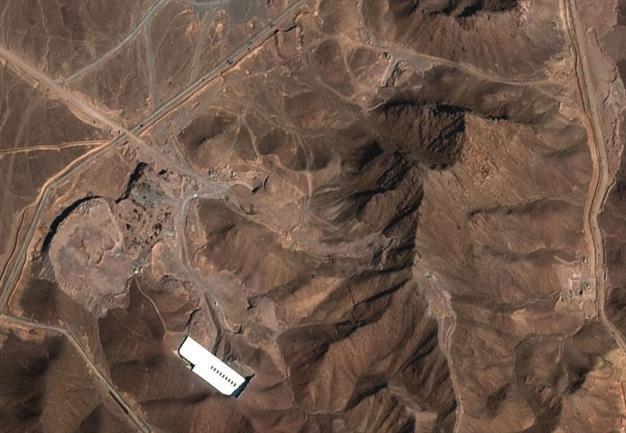Iran begins uranium enrichment at new site: report
TEHRAN - The Associated Press

An aerial view of the Fordo facility. Hürriyet photo
Iran has begun uranium enrichment at a new underground site well protected from possible airstrikes, a leading hardline newspaper reported today.Kayhan daily, which is close to Iran's ruling clerics, said Tehran has begun injecting uranium gas into sophisticated centrifuges at the Fordo facility near the holy city of Qom.
Iran is under U.N. sanctions for refusing to stop uranium enrichment, which can produce both nuclear fuel and fissile warhead material, and other suspected activities that the international community fears could be used to make atomic arms.
Tehran says it only seeks reactors for energy and research, and refuses to halt its uranium enrichment activities.
"Kayhan received reports yesterday that show Iran has begun uranium enrichment at the Fordo facility amid heightened foreign enemy threats," the paper said in a front-page report. Kayhan's manager is a representative of Iran's Supreme Leader Ayatollah Ali Khamenei.
But Iran's nuclear chief Fereidoun Abbasi said late yesterday that his country will "soon" begin enrichment at Fordo. It was impossible to immediately reconcile the two reports.
Iran has a major uranium enrichment facility in Natanz in central Iran where nearly 8,000 centrifuges are operating. Tehran began enrichment at Natanz in April 2006.
The Fordo centrifuges however are reportedly more efficient, and the site better shielded from aerial attack.
Built next to a military complex, Fordo was long kept secret and was only acknowledged by Iran after it was identified by Western intelligence agencies in September 2009.
Both the U.S. and Israel have not ruled out a military strike should Iran continue with its program.
Tehran however says it needs its enrichment program to produce fuel for future nuclear reactors and medical radioisotopes needed for cancer patients.
The country has been enriching uranium to less than 5 percent for years, but it began to further enrich part of its uranium stockpile to nearly 20 percent as of February 2010, saying it needs the higher grade material to produce fuel for a Tehran reactor that makes medical radioisotopes needed for cancer patients. Weapons-grade uranium is usually about 90 percent enriched.
Iran says the higher enrichment activities, of nearly 20 percent, will be carried out at Fordo. These operations are of particular concern to the West because uranium at 20 percent enrichment can be converted into fissile material for a nuclear warhead much more quickly than that at 3.5 percent.
Buried under 90 meters of rock, the facility is a hardened tunnel and is protected by air defense missile batteries and the Revolutionary Guard, Iran's most powerful military force. The site is located about 20 kilometers north of Qom, the religious nerve center of Iran's ruling system.
"The Fordo facility, like Natanz, has been designed and built underground. The enemy doesn't have the ability to damage it," the semiofficial Mehr news agency quoted Abbasi as saying Sunday.
















